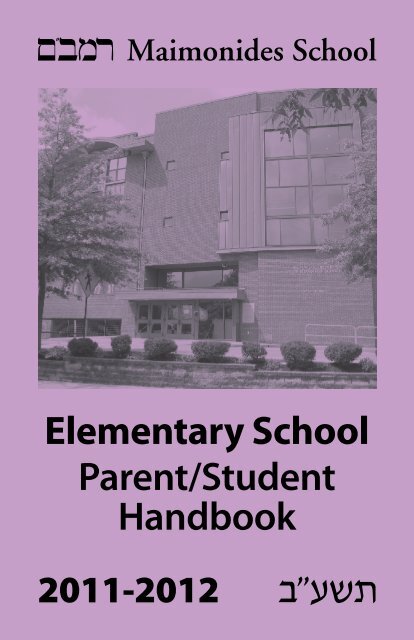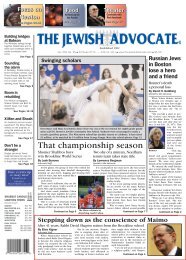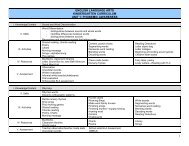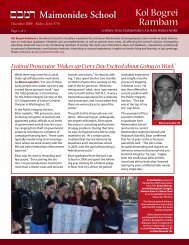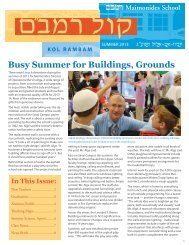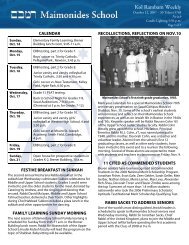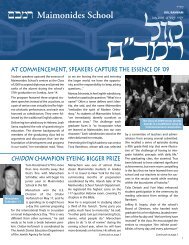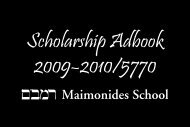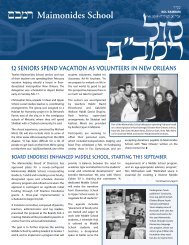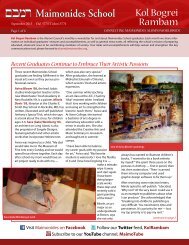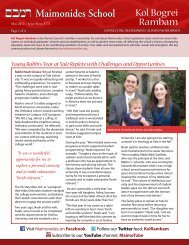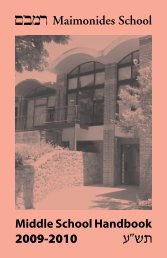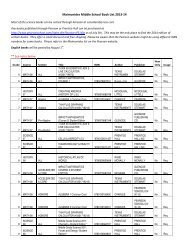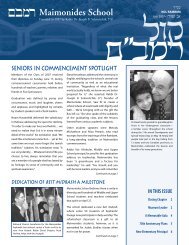Elementary School Parent/Student Handbook - Maimonides School
Elementary School Parent/Student Handbook - Maimonides School
Elementary School Parent/Student Handbook - Maimonides School
You also want an ePaper? Increase the reach of your titles
YUMPU automatically turns print PDFs into web optimized ePapers that Google loves.
<strong>Elementary</strong> <strong>School</strong><br />
<strong>Parent</strong>/<strong>Student</strong><br />
<strong>Handbook</strong><br />
2011-2012 aŠryz
Frequently Called Phone Numbers<br />
Main Number (617) 232-4452<br />
Grades K–5 x 300<br />
Grades 6–8 x 200<br />
Grades 9–12 x 100<br />
<strong>Elementary</strong> <strong>School</strong> Fax (617) 739-8683<br />
Business Office Fax (617) 566-0933<br />
ES Principal Rabbi David Saltzman x 311<br />
ES Associate Principal Reena Slovin x 313<br />
Director of Admissions Ariella Brunwasser x 409<br />
Director of After <strong>School</strong> Activities Dr. Deborah Mehl x 305<br />
Director of <strong>Student</strong><br />
Support Services, K–12 Brenda Hefter x 106<br />
Nurse Brener (Grades K–5) x 419<br />
Saval (Grades 6–12) x 406<br />
Rakezet Ivrit Galit Grutman x 137<br />
<strong>School</strong> Social Worker Katie Hillman x 318
“The individual is responsible, not only for himself, but for the<br />
future. Perhaps his main responsibility is to the future and to the<br />
countless generations that will come after him. The motto of the<br />
Jew has always been the importance of the Mesorah, or<br />
tradition: pass on and transmit. You received from your father<br />
and you must transmit those traditions to your children.”<br />
—The Rav, as quoted in The World of Rabbi Joseph B. Soloveitchik vol. II – page 14<br />
For the last 73 years, <strong>Maimonides</strong> <strong>School</strong> has been educating generations<br />
of Jewish children. As our students continue to grow and learn, we can<br />
proudly proclaim that we are abiding by the objective stated by the Rav<br />
many years ago. It is our joyous duty as parents and educators to partner<br />
together in the sacred transmission of our Torah and traditions.<br />
As such, we would like to take this annual opportunity to re-establish our<br />
dialogue and partnership with each of you. This <strong>Elementary</strong> <strong>School</strong> <strong>Handbook</strong><br />
will inform you about <strong>Maimonides</strong> <strong>School</strong>’s daily operations, and answer<br />
many of your questions regarding the lifestyle and values to which we<br />
ascribe. We are excited to have you join us in building a strong, vibrant, and<br />
joyous school community!<br />
With best wishes for a productive and successful year,<br />
Rabbi David Saltzman<br />
Principal<br />
Reena Slovin<br />
Associate Principal<br />
Naty Katz ’73<br />
Executive Director
This handbook is designed to provide general guidance for school families and students<br />
about current school policies and programs. We reserve the right to amend, delete, or alter<br />
any of its contents as necessary. <strong>Maimonides</strong> families should understand that the statements<br />
contained in this handbook do not constitute a contractual undertaking on behalf of<br />
<strong>Maimonides</strong> <strong>School</strong>.
TABLE OF CONTENTS<br />
Introduction 1<br />
Who’s Who at <strong>Maimonides</strong> 1<br />
Who’s Who in the <strong>Elementary</strong> <strong>School</strong> 2<br />
I. The Religious Dimension 4<br />
Tefilla 4<br />
Dress Code 4<br />
Kashrut 6<br />
Birthday Parties 6<br />
Planning Ahead for Your Child’s Bar/Bat Mitzvah 7<br />
Summer Camps 9<br />
II. Academic Matters: Homework Policy 8<br />
Purposes of Homework 8<br />
Time Spent on Homework 8<br />
<strong>School</strong> Vacations/Weekend Homework 9<br />
<strong>Parent</strong> Involvement in Homework 9<br />
Differentiation of Homework for Diverse Learners 9<br />
Grading and Late/Missed Homework Policies 10<br />
III. Communication 10<br />
IV. Expectations for Behavior 12<br />
Behavior Management 12<br />
<strong>Student</strong> Expectations 12<br />
Logical Consequences for Misbehavior 12<br />
V. Meeting Individual Needs 13<br />
Enrichment 13<br />
<strong>Student</strong> Support Services 13<br />
VI. General Policies and Procedures 16<br />
Arrival 16<br />
Dismissal 16<br />
Traffic and Parking Policies 17<br />
Inclement Weather, Closings/Delays, Weather Dismissals 19<br />
Library 20<br />
Special Activities 20<br />
After <strong>School</strong> Opportunities 21
Professional Days/Faculty Meetings 22<br />
Food 22<br />
Health Procedures 23<br />
Class Placement 25<br />
Volunteering 25<br />
Family Learning 25<br />
Appendix: Who(m) to Call for What 26
<strong>Elementary</strong> <strong>School</strong> <strong>Handbook</strong>, 2011-2012 1<br />
INTRODUCTION<br />
Welcome to <strong>Maimonides</strong> <strong>Elementary</strong> <strong>School</strong>! We are happy you have chosen to<br />
join the <strong>Maimonides</strong> community. We know that we can count on you to help us<br />
create a warm and welcoming atmosphere inspired by our unique mission and<br />
values. We encourage our families to familiarize themselves with the guidelines<br />
outlined herein. Further information can be found by checking out our website at<br />
www.maimonides.org.<br />
Who’s Who at <strong>Maimonides</strong><br />
The All-<strong>School</strong> Administrative Team (ASAT)<br />
Together, the All-<strong>School</strong> Administrative Team directs and manages all academic<br />
programs and operations of the school and is collectively responsible for student<br />
welfare and academic progress.<br />
Judy Boroschek, Middle & Upper <strong>School</strong> General Studies Principal, oversees all<br />
General Studies faculty, programs, curricula, professional development,<br />
supervision and evaluation, and student progress in the Middle and Upper <strong>School</strong>.<br />
Brian Cohen, Assistant Principal for the Middle <strong>School</strong>, directs all aspects of the<br />
Middle <strong>School</strong>, with a special focus on programming and student life.<br />
Barry Ehrlich, Director of Curriculum and Instruction, Grades K-12 oversees<br />
curriculum reviews, instruction, and faculty professional development for all<br />
grades.<br />
Brenda Hefter, Director of <strong>Student</strong> Support K–12, oversees all student academic<br />
support.<br />
Rabbi Dov Huff, Middle & Upper <strong>School</strong> Assistant Principal, assists the Principals in<br />
all aspects of school management, with a special focus on student life.<br />
Nathan Katz, Executive Director, leads all academic and business operations of the<br />
school; chairs ASAT; supervises the principals; and reports to the Board of<br />
Directors.<br />
Rabbi Yaakov Jaffe, Middle & Upper <strong>School</strong> Judaic Studies Principal, oversees all<br />
Judaic Studies faculty, programs, curricula, professional development, supervision<br />
and evaluation, and student progress in the Middle and Upper <strong>School</strong>, with a<br />
special focus on religious life.<br />
Rabbi David Saltzman, <strong>Elementary</strong> <strong>School</strong> Principal, oversees all academic policies,<br />
religious life, faculty, programs, curricula, and student progress in the <strong>Elementary</strong><br />
<strong>School</strong>.<br />
Reena Slovin, <strong>Elementary</strong> <strong>School</strong> Associate Principal, oversees, with Rabbi Saltzman,<br />
all academic policies, religious life, faculty, programs, curricula, and student<br />
progress in the <strong>Elementary</strong> <strong>School</strong>, and coordinates student support services.<br />
Admissions<br />
Ariella Brunwasser, Director of Admissions, handles all matters related to student<br />
recruitment and admission to the school.<br />
Maryn Herberg, Admissions Assistant, supports the Director of Admissions.
תשע "ב 2 <strong>Maimonides</strong> <strong>School</strong><br />
Operations<br />
Mervin Alge, Director of Operations, is responsible for buildings and grounds,<br />
security, buses, nurses, and logistics for school events. Our maintenance and<br />
custodial staff all report to Merv, as well as the security and cleaning service<br />
companies.<br />
Chris Russell, Director of Technology, supports and maintains hardware, software<br />
and networks throughout the school including voicemail and email.<br />
Clinton Ray, Facilities Manager, supervises the maintenance staff, and lives oncampus.<br />
Business Office<br />
Karen McAvoy, Director of Finance and Accounting, oversees all Business Office<br />
functions, budgeting, financial planning, and payroll.<br />
Arline Tannenbaum, Operations Administrator, manages human resources<br />
(including any questions about benefits), financial aid applications and grants.<br />
Elka Tovah Davidoff, Executive Assistant, supports the Executive Director and the<br />
Business Office, and coordinates requests for room reservations.<br />
Office of Institutional Advancement<br />
Mike Rosenberg, Director of Alumni and Community Relations, is responsible for all<br />
alumni and parent publications, coordination of fundraising events, and all alumni<br />
relations.<br />
Naomi Ribner, Director of Communications, manages all publications and print<br />
materials, assists with special events, and serves as a resource to teachers and<br />
administrators. She is also the webmaster for www.maimonides.org.<br />
Ellen Pulda, PR & Media Relations Officer, writes about the school for internal<br />
newsletters and external media, assists with special events, and works with the<br />
administration and lay leadership (including the PTA) to promote school spirit and<br />
visibility in the Boston Jewish community.<br />
Josh Sandler, Development Officer, manages all fundraising efforts including the<br />
Annual Campaign.<br />
Who’s Who in the <strong>Elementary</strong> <strong>School</strong><br />
Administration:<br />
Principal<br />
Rabbi David Saltzman<br />
Associate Principal<br />
Mrs. Reena Slovin<br />
K-12 Director of Support Services Mrs. Brenda Hefter<br />
Director of Admissions<br />
Ms. Ariella Brunwasser<br />
Social Worker<br />
Ms. Katie Hillman<br />
Director of After-<strong>School</strong> Programs<br />
Dr. Deborah Mehl<br />
Administrative Assistant<br />
Mrs. Anastasia Schnittke<br />
Administrative Asst. & Admissions Asst. Ms. Maryn Herberg<br />
<strong>School</strong> Nurse<br />
Mrs. Robin Shuman
<strong>Elementary</strong> <strong>School</strong> <strong>Handbook</strong>, 2011-2012 3<br />
Substitute <strong>School</strong> Nurse<br />
Teaching Staff:<br />
K General Studies<br />
K Limudei Kodesh<br />
K Limudei Kodesh<br />
Gr. 1 General Studies<br />
Gr. 1 Limudei Kodesh<br />
Gr. 1 Classroom Assistant<br />
Gr. 2 General Studies<br />
Gr. 2 Limudei Kodesh<br />
Gr. 2 Classroom Assistant<br />
Gr. 3 General Studies<br />
Gr. 3 Limudei Kodesh<br />
Gr. 3 Classroom Assistant<br />
Gr. 4 General Studies<br />
Gr. 4 Limudei Kodesh<br />
Gr. 5 General Studies<br />
Gr. 5 Limudei Kodesh<br />
Ivrit Teachers<br />
Art<br />
Music<br />
Science<br />
Physical Education<br />
English Literacy Specialist<br />
Ivrit Literacy Specialist<br />
Support Services Staff<br />
<strong>Elementary</strong> Math Curriculum Coordinator<br />
Math Specialists<br />
Building Substitute<br />
Maintenance<br />
Gateways Speech/Language Specialist<br />
Gateways Speech/Lang/Reading Specialist<br />
Gateways Occupational Therapist<br />
Gateways Learning Specialist<br />
Gateways Day <strong>School</strong> Coordinator<br />
Shlichot of Bnei Akiva<br />
Mrs. Nancy Lastoff<br />
Ms. Kristen Fucarile<br />
HaMorah Myriam Lebowitz<br />
HaMorah Irene Blechner<br />
HaMorah Julia Gilbert<br />
HaMorah Rosalie Koblick<br />
TBA<br />
Ms. Allison Longo<br />
HaMorah Nehama Libman<br />
Ms. Jenna Adler<br />
Mr. Avi Pittleman<br />
HaMorah Michal Bessler<br />
Mrs. Rose-Jane Sulman<br />
Mrs. Victoria Zenlea<br />
HaMorah Chaya Durani<br />
Mrs. Zippy Portman<br />
Rabbi Dovid Reisman<br />
HaMorah Efrat Lipshitz<br />
HaMorah Galit Konstantine<br />
HaMorah Orit Steinberg<br />
Ms. Anne-Marie Moore<br />
Ms. Emily Bilodeau<br />
Ms. Katie Muratore<br />
Mr. Ernie D’Agnelli<br />
Mrs. Deborah Caban<br />
Mrs. Lilly Hearns<br />
HaMorah Galit Konstantine<br />
Mrs. Maxine Zizmor<br />
Mrs. Brenda Slobodkin<br />
Mrs. Beverly Levenson<br />
HaMorah Limor Cohen-Melul<br />
Mrs. Debbie Shein-Gerson<br />
Mrs. Donna Verdun<br />
Mrs. Elaine Geracht<br />
Mr. Sam Tarlin<br />
Mr. Beni Alvarado<br />
Mrs. Leslie Kates<br />
Mrs. Jen Newman<br />
Mrs. Rochelle Goldin<br />
Mrs. Beth Crastnopol<br />
Mrs. Sharon Goldstein<br />
Hodaya Wasserzug<br />
Dovrat Ostroff
תשע "ב 4 <strong>Maimonides</strong> <strong>School</strong><br />
I. THE RELIGIOUS DIMENSION<br />
<strong>Maimonides</strong> <strong>School</strong> aims to provide more than just a theoretical Jewish education.<br />
Our goal is to offer daily opportunities for students to learn Torah, practice Mitzvot,<br />
and grow in their Midot within a community of people who share that love, joy,<br />
and commitment. Our ultimate purpose is to foster within each child a<br />
commitment to Halacha that extends throughout his/her entire life. We strive to<br />
inculcate our students with the tools, character, and values that empower them to<br />
begin reflecting upon their emerging religious identity. <strong>Student</strong>s are both<br />
supported and challenged as they learn to appreciate the unique responsibilities<br />
they hold in relation to their parents, teachers, classmates, community, and planet,<br />
as well as their special and powerful relationship with God.<br />
Tefilla (Prayer)<br />
By praying each day with their classmates, students learn the beauty and power<br />
that resides within a prayer community. This daily practice effectively familiarizes<br />
students with the daily Tefillot. Classes begin with Tefilla and it is therefore<br />
expected that students arrive on time by 7:55 AM.<br />
Dress Code<br />
The prophet Micha declares, “What does Hashem ask of you: Only to do justly, love<br />
mercy, and walk modestly with God” (6:8). From this context, it is clear that a<br />
sense of modesty should pervade a Jew’s conduct throughout his/her life journey.<br />
It is this overarching aim that inspires the Sages to latch onto particulars to help<br />
give shape to what can otherwise become theoretical.<br />
Here at <strong>Maimonides</strong> <strong>School</strong>, we help students understand the value of modesty<br />
through their speech, actions, and dress. Our dress code is one implementation of<br />
this value. We request that parents support this goal by sending their children to<br />
school in suitable clothing. We recognize that modern fashion often makes finding<br />
appropriate clothing more difficult, and welcome you to consult with other<br />
<strong>Maimonides</strong> parents for tips. Additionally, Principal Rabbi David Saltzman and<br />
Associate Principal Reena Slovin are happy to help you navigate these issues.<br />
Attire<br />
• Shoes—Grades K-2: In order to be prepared for physical education classes<br />
and twice-daily recess, both boys and girls in Grades K-2 are required to wear<br />
sneakers every day. Shoes with straps, heels, or buckles—such as sandals or<br />
Shabbat-type shoes—are not permitted for safety reasons.<br />
• Shoes—Grades 3-5: In the interest of safety at recess and on the stairs,<br />
students in Grades 3-5 are encouraged to wear sneakers daily. High heels, flipflops,<br />
or other shoes not suitable for active play should not be worn. Sneakers<br />
are required for all physical education classes.<br />
• Outdoor Gear: Due to the health benefits of outdoor activity, it is our school’s<br />
policy to allow students to have recess in the yard barring severe weather<br />
conditions (temperatures below 20 degrees). We therefore request that your<br />
children come to school properly dressed for the elements—wearing hats,
<strong>Elementary</strong> <strong>School</strong> <strong>Handbook</strong>, 2011-2012 5<br />
coats, boots, gloves, and other accessories. <strong>Parent</strong>s will be called to bring<br />
clothing appropriate for the season if students arrive unprepared.<br />
• Special Dress: On weekday holidays, we like to create a festive atmosphere by<br />
having students wear different clothing. On Rosh Chodesh, all students should<br />
wear white tops. On Yom HaAtzma’ut and Yom Yerushalayim, boys should<br />
wear blue slacks and white tops, and girls should wear blue skirts and white<br />
tops. On Yom HaShoah and Yom HaZikaron, boys should wear black pants and<br />
white tops and girls should wear black skirts and white tops. Please check out<br />
the school calendar and read our weekly newsletter for announcements<br />
regarding special attire.<br />
• Hats: Baseball caps, winter hats, or any other hats must be removed when<br />
entering the school building.<br />
• Messages on Shirts: Shirts containing messages or pictures not in keeping<br />
with the atmosphere of a religious school are not permitted.<br />
• Events/Trips: The dress code is in effect for all special events (e.g., science fair,<br />
end-of-year bash) and for all activities, including field trips.<br />
• Purim: Although students are permitted to dress up and to wear makeup or<br />
face paint on Purim, it is expected that standards of modesty will be<br />
maintained. Also, no weapon facsimiles or military toys of any sort may be<br />
brought to school on Purim.<br />
• Make-up: Make-up of any type may not be worn, except for during the Purim<br />
carnival.<br />
• Shorts: Only Kindergarten students are permitted to wear shorts.<br />
• Field Day: On field day and color war, both girls and boys should wear loosefitting<br />
pants.<br />
Attire Specific to Boys<br />
• Boys must wear Kippot and Tzitzit to school as well as at special activities and<br />
events. Clips or bobby pins are helpful in keeping Kippot on the heads of<br />
active boys.<br />
• In accordance with Torah law, boys’ sideburns may not be trimmed higher<br />
than mid-ear.<br />
• All boys in Grades 3-5 must wear polo or buttoned dress shirts, with full<br />
collars; sweaters, turtlenecks, and jackets do not qualify as collared shirts. Shirts<br />
should be fully buttoned, except for the top button at the collar.<br />
• Boys may not wear jeans, wind pants, track pants, sweatpants, or T-shirts<br />
during the school day, except during gym.<br />
Attire Specific to Girls<br />
• Skirts: Girls must wear skirts or dresses to school. Skirts must be long enough<br />
to cover the knees when seated. Slits in skirts may not be higher than the knee.<br />
Loose-fitting skirts are strongly suggested, as they allow girls to be full<br />
participants in active play at recess.<br />
• Sleeves: Dresses, blouses, and shirts must have sleeves that extend midway<br />
between shoulder and elbow (i.e., no cap sleeves).
תשע "ב 6 <strong>Maimonides</strong> <strong>School</strong><br />
• Tops: Tops must be long enough to overlap with skirts (or pants during gym)<br />
at all times, even with the arms raised. Tops, shirts, and sweaters should not be<br />
excessively tight, and the neckline must not dip too low.<br />
• Pants: Girls in Grades 1-5 may wear tights, leggings, or pants under skirts. They<br />
may not wear jeans or pajama pants under skirts. Loose-fitting sweatpants (not<br />
yoga pants, leggings, tights, or shorts) may be worn alone during gym or for<br />
field day.<br />
Kashrut<br />
The <strong>Maimonides</strong> community keeps Kosher according to the standards set by<br />
Orthodox rabbinical authorities. We respectfully ask that families serve Kosher<br />
food in their homes to their children’s classmates, and that Kosher food items are<br />
brought for lunches and snacks. If a class party is taking place, parents should<br />
please bring store-bought rather than homemade treats.<br />
The following are the Kosher symbols authorized by the school:<br />
Although they can be misleading, the plain letter K and other symbols are<br />
unreliable indicators of the Kosher status of a food item. As questions arise, we<br />
encourage you to use the following resources to stay informed about these issues:<br />
1. Principal Rabbi David Saltzman at 617-232-4452 x311;<br />
2. Your local Orthodox Rabbi;<br />
3. The Va'ad HaRabbonim at 617-426-2139;<br />
4. The Kashrut Division of the Union of Orthodox Jewish Congregations of<br />
America at 212-563-4000 or www.oukosher.org;<br />
5. A good website on keeping Kosher in the Boston area is the Kashrus.com<br />
website at: www.kashrut.com/travel/Boston<br />
Birthday Parties<br />
Birthday Parties at <strong>School</strong><br />
In Kindergarten, the teachers plan and organize a classroom birthday party for<br />
each child, and summer birthdays are celebrated at the beginning of the year.<br />
Instead of sending treats, parents may purchase a book in honor of their child’s<br />
birthday through the PTA’s Birthday Book program, mentioned in the Library<br />
section of this handbook.<br />
Birthday Parties Outside of <strong>School</strong><br />
In order to be considerate of all children, <strong>Maimonides</strong> <strong>School</strong> asks parents to select<br />
from one of the following guidelines when inviting their child’s classmates:<br />
1. Invite the entire grade or class;
<strong>Elementary</strong> <strong>School</strong> <strong>Handbook</strong>, 2011-2012 7<br />
2. Invite all the boys or all the girls in the grade or class;<br />
3. Invite a very small number of friends from the grade or class.<br />
Please mail invitations to children’s homes rather than distributing them in school.<br />
Movies<br />
Care should be taken that movies shown at parties are those with which parents of<br />
all children will feel comfortable.<br />
Kashrut<br />
At these celebrations, please follow the kosher guidelines mentioned earlier.<br />
Planning Ahead for Your Child’s Bar/Bat Mitzvah<br />
To assist families in planning Bar or Bat Mitzvah celebrations, <strong>Maimonides</strong> <strong>School</strong><br />
maintains an online calendar of date reservations, maintained by one of our<br />
parents, Dan Gruen. It can be viewed at<br />
http://www.maimonides.org/pwDocs/simchaCalendar.php<br />
(User name: maimoparents; password: horim).<br />
We encourage all our families to sign up as early as possible by e-mailing<br />
MaimoSimchaList@gmail.com to add a date request or discuss a potential<br />
conflict.<br />
Summer Camps<br />
The summer camp experience is an important one in a child's life, with significant<br />
social, emotional and religious implications. The environment created by summer<br />
camps has a profound impact on children and pre-teenagers. Should you need<br />
assistance in finding a camp in which Torah values are reinforced, Rabbi Saltzman<br />
will be happy to provide you with guidance.<br />
II. ACADEMIC MATTERS: HOMEWORK<br />
The <strong>Maimonides</strong> <strong>School</strong> community strongly believes in the myriad benefits<br />
derived from a quality education. Classroom study is sometimes supplemented by<br />
assigned work at home. The section below outlines <strong>Maimonides</strong> <strong>Elementary</strong><br />
<strong>School</strong>’s homework policies.<br />
1) PURPOSES OF HOMEWORK<br />
All homework assignments must fulfill one of the following four purposes:<br />
1) Pre-learning (reading a book, reading an article, researching on the<br />
computer)<br />
2) Checking for Understanding (responding to journal questions,<br />
explaining strategies for solving math problems;)
תשע "ב 8 <strong>Maimonides</strong> <strong>School</strong><br />
3) Practice (rote skills, spelling words, reading, support and modifications<br />
for children who need extra review of skill)<br />
4) Processing (reflection, application and enrichment)<br />
The following best homework practices should be made clear to students by<br />
teachers and parents:<br />
• Designate an appropriate location for homework completion.<br />
• Go through backpack to make sure all homework materials are there.<br />
• Keep all materials near desk or work table.<br />
• Put materials away when completed.<br />
• Make sure food is not around while completing homework.<br />
• Have a parent check that student has completed assigned homework.<br />
2) TIME SPENT ON HOMEWORK<br />
• The time allotment is meant to be the goal for amount of homework<br />
assigned. On occasion, less homework may be assigned, but never more.<br />
• If a student has not completed the assigned homework within the time<br />
limit allotted, he/she should stop working and a note should be sent by<br />
the parent to the teacher.<br />
• The time allotment is inclusive of assignments, test preparation, longterm<br />
project preparation and reading practice.<br />
• The time allotment is coordinated among teachers of all subjects at a<br />
given grade level, including specials and science, and may focus on one<br />
subject or another on a given night.<br />
• Some assignments may be given over the course of several nights or an<br />
entire week, and the time-per-night indicated is an average of the total<br />
time. <strong>Student</strong>s may choose to apportion this work over the course of the<br />
week any way that they want.<br />
• Homework is considered work to be completed at home, and class time<br />
should not be devoted to its completion, other than directions, examples<br />
and explanations.<br />
Grade 5:<br />
Grade 4:<br />
Grade 3:<br />
Grade 2:<br />
Grade 1:<br />
60 minutes average, 4 nights a week<br />
50 minutes average, 4 nights a week<br />
40 minutes average, 4 nights a week<br />
30 minutes average, 4 nights a week<br />
15 minutes average, 4 nights a week<br />
3) SCHOOL VACATIONS / WEEKEND HOMEWORK<br />
Teachers should not assign homework right before a weekend or school vacation<br />
that is due immediately after the weekend or vacation, nor schedule tests for<br />
immediately after a weekend or vacation. <strong>School</strong> vacations and weekends are for<br />
social/emotional development, strengthening of parent-child bonds, exercise and<br />
unregimented play. <strong>Student</strong>s should be encouraged to budget their time so as not<br />
to need to study over weekends or vacation. Reading should be strongly
<strong>Elementary</strong> <strong>School</strong> <strong>Handbook</strong>, 2011-2012 9<br />
encouraged but not required. Some parents and students may choose to do skill<br />
practice and review over the weekend if this fits best with their child’s and/or<br />
family’s learning and work style.<br />
4) PARENT INVOLVEMENT IN HOMEWORK<br />
<strong>Parent</strong>s are encouraged to...<br />
• Ask their child about what the child is studying in school.<br />
• Ask their child to show them any homework assignments.<br />
• Assist their child in organizing homework materials.<br />
• Help their child formulate a plan for completing homework.<br />
• Provide an appropriate space for their child to do homework.<br />
<strong>Parent</strong>s may, if they wish...<br />
• Help their child interpret assignment directions.<br />
• Listen to their child read required reading aloud.<br />
• Give practice quizzes to their child to help prepare for tests.<br />
• Help their child brainstorm ideas for papers or projects.<br />
• Discuss or study with their child subject matter related to topics learned<br />
at school.<br />
• Praise their child for completing homework.<br />
<strong>Parent</strong>s should not...<br />
1. Attempt to teach their child concepts or skills with which the child is<br />
unfamiliar.<br />
2. Complete assignments for their child.<br />
3. Allow their child to sacrifice sleep to complete homework, if the child has<br />
already put in the required time. If the parent instructs the child to stop<br />
the homework once the allotted time has elapsed, they should inform<br />
the teacher.<br />
5) DIFFERENTIATION OF HOMEWORK FOR DIVERSE LEARNERS<br />
Support students and enrichment students are the prime groups to receive<br />
modified homework when appropriate. Either the classroom teacher or the<br />
support/enrichment teacher can play a key role in modifying the homework with<br />
the input of others if applicable.<br />
Differentiation of homework for some students may include one or more of the<br />
following modifications:<br />
1. Time maximums set in place for differentiated homework;<br />
2. Simpler or more complex questions for different students;<br />
3. Fewer or more questions/problems to complete for different students<br />
4. Assignments that are based on the same learning principles but require a<br />
different mode of expression other than in writing (for example, visual or<br />
oral expression)<br />
5. Due dates may be made more flexible.
תשע "ב 10 <strong>Maimonides</strong> <strong>School</strong><br />
6. <strong>Student</strong>s with OT issues, including poor handwriting, can receive<br />
modifications such as typing homework, using AlphaSmart, and/or using<br />
voice recognition devices.<br />
6) GRADING AND LATE HOMEWORK POLICIES<br />
Grading Policies<br />
Grades 1-5: Homework should be checked by the teacher and handed back in a<br />
timely manner with meaningful comments and feedback. This practice enables<br />
homework to be a useful instructional and learning tool.<br />
Late Homework:<br />
• In general, if homework is not completed, it should be done the<br />
following night.<br />
• <strong>Student</strong>s who have an ongoing issue with homework completion will<br />
work together with faculty and parents to devise a plan to address the<br />
problem.<br />
• Teachers may ask parents to sign off on homework assignments after<br />
they are completed.<br />
Missed Homework<br />
In the event of an absence, the school suggests that the parent find a classmate to<br />
bring home the day’s assignments.<br />
In the event that a student takes a vacation that is not during a regular school<br />
vacation, teachers are not expected to provide missed school work or homework<br />
in advance. Upon the student’s return to school, parents are responsible for<br />
getting the missed work from their child’s teachers and seeing to it that it is<br />
completed by the student. <strong>Parent</strong>s should encourage their child to contact a<br />
classmate or pre-assigned “buddy” to help them find out what work has been<br />
missed.<br />
III. COMMUNICATION<br />
Open, regular communication between teachers and parents is crucial to the<br />
success of children at school. <strong>Maimonides</strong> <strong>School</strong> aims to foster dialogue between<br />
parents and teachers around how best to meet the needs of each child. <strong>Parent</strong>teacher<br />
conferences and report cards are a formal method by which teachers will<br />
be reaching out to parents throughout the year, while informal e-mails offer a<br />
great way for staying in touch on an ongoing basis as needed.<br />
Conferences: <strong>Parent</strong>-teacher conferences are held twice yearly in the fall and<br />
spring, and sign up is conducted online. <strong>Parent</strong>s will receive information in the<br />
mail approximately 6-8 weeks in advance with complete instructions. A meeting<br />
between parents and teachers may be arranged individually should the need arise.<br />
Teachers should be parents’ first point of contact, and administrators should be<br />
reached out to as well if an issue remains unresolved.
<strong>Elementary</strong> <strong>School</strong> <strong>Handbook</strong>, 2011-2012 11<br />
Report Cards: Electronic report cards focus on both the social/emotional aspects<br />
of the child’s development, as well as his or her growing academic skills and<br />
knowledge. They are scheduled for distribution before conferences and at the<br />
year’s end. Each report includes a narrative portion along with feedback about<br />
specific skills.<br />
Class Newsletters: Teachers will send home news of class activities through<br />
parent letters or class newsletters throughout the year.<br />
ES Update: This weekly e-newsletter highlighting <strong>Elementary</strong> <strong>School</strong> news and<br />
events is emailed to parents and may also be viewed from the school website.<br />
Kol Rambam: Published quarterly, the Kol Rambam provides informative articles<br />
about the <strong>Elementary</strong>, Middle, and Upper <strong>School</strong>s. An e-supplement, Kol Rambam<br />
Weekly, is both distributed and posted to the school website.<br />
Website: Information, useful forms and documents, photographs, curriculum<br />
outlines, and news about the <strong>Elementary</strong> <strong>School</strong> are available on the <strong>Maimonides</strong><br />
<strong>School</strong> website at www.maimonides.org.<br />
Telephone and E-mail: Messages for students received during the day will be<br />
communicated to them through their teachers. To leave a message for a teacher or<br />
administrator, please call the main number, 617-232-4452, to reach a directory of<br />
teachers’ voicemails.<br />
Communicating Concerns: Concerns will be addressed in a timely fashion, and all<br />
e-mails or phone calls will be responded to by the end of the next school day. A<br />
parent with a concern about his or her child should follow this procedure:<br />
• Contact the teacher directly by sending an e-mail or leaving a voicemail.<br />
Often, the parent and the teacher together have the information needed to<br />
handle the situation.<br />
• The teacher will respond by contacting the parent to set up a meeting or<br />
arrange for a phone call to discuss the matter.<br />
• <strong>Parent</strong>s should not interrupt the teacher in class or during the school day, nor<br />
should parents call a teacher at home.<br />
Keep Us Informed<br />
When children come to school, it is important to remember that they are products<br />
of their home life. Everything that happens in the home significantly affects our<br />
children—including their behavior, attitudes, and ability to concentrate. Therefore,<br />
it is essential that the school be made aware of any unusual events taking place in<br />
your family. This includes births, marriages, anticipated trips, illnesses, deaths, or<br />
special occasions. Please keep us posted regarding the ups and downs of your<br />
family life so that we can deal with your child in the most informed, sensitive, and<br />
understanding manner.
תשע "ב 12 <strong>Maimonides</strong> <strong>School</strong><br />
IV. EXPECTATIONS FOR BEHAVIOR<br />
Behavior Management<br />
Our goal is to create and maintain an environment in which everyone has an<br />
opportunity to act responsibly, to feel respected, and to learn. The following<br />
guidelines were developed by the faculty.<br />
<strong>Student</strong> Expectations<br />
Each student should strive to demonstrate the following expected behaviors<br />
which make up the Classroom Code of Conduct:<br />
Respect<br />
• We raise our hands and wait to be called upon to speak.<br />
• We ask permission to use things that do not belong to us.<br />
• We are polite to others, treating them as we want to be treated.<br />
• We listen politely when others speak.<br />
Responsibility<br />
• For our safety and learning, we follow our teachers’ directions.<br />
• We accept responsibility for our decisions.<br />
• We support and participate in class lessons and activities.<br />
• We complete all work as best we can.<br />
Safety<br />
• We do not touch others.<br />
• We stay where we belong.<br />
• We use things for what they are designed to do.<br />
In addition, students should be reminded of the following rules.:<br />
• We walk at all times in the building, except in the gymnasium.<br />
• We contribute to respectful davening and benching.<br />
• We speak softly in the school hallways and cafeteria.<br />
• We keep the school clean by picking up after ourselves in the classrooms, the<br />
hallways, the restrooms, the cafeteria, and the recess yard.<br />
Logical Consequences for Misbehavior<br />
Logical consequences are related directly to children's behaviors and help guide<br />
them through mistakes. The use of logical consequences is part of an approach to<br />
discipline used within the <strong>Maimonides</strong> <strong>Elementary</strong> <strong>School</strong>. Logical consequences<br />
are a powerful way of responding to children’s misbehavior that is not only<br />
effective in stopping the behavior but respectful of children and helps them take<br />
responsibility for personal actions.<br />
The goal of logical consequences is to help children develop internal<br />
understanding, self-control, and a desire to follow rules by challenging students to<br />
value compliance over consequence. Logical consequences help children look
<strong>Elementary</strong> <strong>School</strong> <strong>Handbook</strong>, 2011-2012 13<br />
more closely at behaviors and consider the results of choices. Logical<br />
consequences are respectful of the child’s dignity and respond to the misbehavior<br />
in ways preserving the dignity of the child.<br />
Electronic Games and Cell Phones<br />
We encourage students to use recess time to enjoy the fresh air and to be active.<br />
<strong>Student</strong>s are welcome to bring in soft balls or other equipment suitable for<br />
playing in a busy play school yard. We have found that cell phones, iPods,<br />
GameBoys® and similar electronic devices detract from the time our children<br />
spend enjoying the fresh air. Likewise, trading cards have proven to be a<br />
disruption to classes and recess. Therefore, we ask parents to refrain from sending<br />
children to school with any of these devices.<br />
V. MEETING INDIVIDUAL NEEDS<br />
<strong>Maimonides</strong> faculty members take great care to plan lessons which challenge<br />
students at their own level. Teachers approach students as individuals with unique<br />
and diverse learning styles and behaviors. They make every effort to differentiate<br />
their classroom instruction based upon student readiness levels, learning<br />
preferences, and interests. <strong>Maimonides</strong> faculty analyze student learning in order to<br />
better adapt content, activities and assessments, thereby enabling all students to<br />
succeed at school. An extensive support staff allows the<br />
Enrichment<br />
Most academic enrichment for students is provided within the regular classroom.<br />
<strong>Maimonides</strong> is committed to differentiated instruction as a way to meet the<br />
unique needs, learning styles, and interests of all students. Differentiated<br />
instruction is effective, research-based teaching concurrently meeting the needs<br />
of all learners in the classroom through methods such as tiered instruction,<br />
learning centers, anchoring activities, curricular modifications, and the provision of<br />
challenge assignments and projects. Teachers are encouraged to seek ways to<br />
assess students in order to determine their needs and to provide quality<br />
enrichment opportunities for those for whom it is appropriate. Ongoing<br />
assessments before and after each unit give teachers an accurate sense of each<br />
student’s level of mastery. They are supported in these efforts by instructional<br />
assistants and learning specialists.<br />
A number of enrichment activities are offered outside the regular classroom,<br />
taught by contracted professionals. Some activities are voluntary and open to any<br />
interested student. Other enrichment activities are offered to selected students<br />
based on academic skill level. <strong>Parent</strong>s will be contacted if their child’s teacher<br />
determines that he or she would benefit from enrichment.<br />
<strong>Student</strong> Support Services<br />
A wide variety of support is available to <strong>Elementary</strong> <strong>School</strong> students through the<br />
Department of <strong>Student</strong> Support Services. This department includes English and<br />
Hebrew reading and literacy Specialists, Math Support and Enrichment Specialists,<br />
and general Curriculum Support Teachers for both General Studies and Limudei
תשע "ב 14 <strong>Maimonides</strong> <strong>School</strong><br />
Kodesh. Classroom teachers are encouraged to consider support service specialists<br />
a regular part of the grade level team and to partner with them in assessing and<br />
meeting the needs of each student. Individual learning specialists are assigned to<br />
work with specific grades and/or classes and meet regularly with classroom<br />
teachers. Decisions about what services are provided to which students, are made<br />
collaboratively under the direction of Brenda Hefter, Reena Slovin, and Maxine<br />
Zizmor.<br />
Referral Process for <strong>Student</strong> Support Services<br />
Teachers are asked to monitor students closely for signs of difficulty with any of<br />
the following: language comprehension or expression; speech articulation;<br />
reading accuracy, fluency or comprehension; gross or fine motor deficiencies;<br />
memory; attention; or any other learning difficulties. Feedback about observations<br />
in these areas should be relayed to Reena Slovin or Maxine Zizmor to determine<br />
the appropriate course of action. The following process for referring a student for<br />
support services should be followed:<br />
1) Possible Sources of Referral:<br />
a. <strong>Parent</strong> notices issue;<br />
b. Teacher notices issue;<br />
c. Regularly administered classroom interim assessments indicate need for<br />
intervention.<br />
2) <strong>Parent</strong>s notified by classroom teacher; internal informal assessment<br />
completed by specialist(s) to determine possible need for intervention.<br />
3) Findings reported to teachers (by the specialist) and to parents (by classroom<br />
teacher); decision made as to intervention.<br />
4) Trial short-term intervention is implemented by the appropriate specialist for<br />
8 weeks.<br />
5) Progress monitored and follow-up assessments completed by specialist.<br />
6) Results reported by specialist to parents and classroom teachers; decision<br />
made as to continued intervention.<br />
7) If continued intervention determined necessary:<br />
a. New <strong>Maimonides</strong> educational plan sent to parents.<br />
b. Progress monitoring and further assessments completed by specialist.<br />
c. Specialist collaborates with classroom teacher in writing of regular<br />
progress reports.<br />
d. Specialist joins classroom teachers at parent-teacher conferences.<br />
e. After six months, if student still needs intervention, recommendation is<br />
made for formal evaluation and parent is notified by specialist.<br />
8) If formal evaluation indicates recommendation for <strong>Student</strong> Support Services:<br />
a. <strong>Maimonides</strong> team convenes to determine extent of <strong>Maimonides</strong> services.<br />
b. When appropriate, public school, Gateways, or private services are<br />
obtained in addition to <strong>Maimonides</strong> services.<br />
c. Revised <strong>Maimonides</strong> educational plan is written.<br />
d. Support progress reports are written and sent to parents along with<br />
regular progress reports.
<strong>Elementary</strong> <strong>School</strong> <strong>Handbook</strong>, 2011-2012 15<br />
e. <strong>Student</strong>s receiving ongoing support receive an updated <strong>Maimonides</strong><br />
educational plan annually in September.<br />
Outside Additional Support Services<br />
We have expanded the support services provided by our department by<br />
partnering with the Day <strong>School</strong> Program of Gateways: Access to Jewish Education.<br />
Gateways is committed to helping students with learning differences succeed at<br />
their day schools; it provides specialized services above and beyond, and in<br />
coordination with, the school’s existing support services. Gateways staff includes<br />
occupational therapists, speech-language pathologists, and reading specialists to<br />
provide more specialized and individualized intensive support. Gateways provides<br />
offers services to students in and out of the classroom, consults with classroom<br />
teachers, and meets with school staff, <strong>Maimonides</strong> learning specialists, and<br />
parents.<br />
At times, families may be advised by the school that a student might benefit from<br />
private tutoring. In other cases, parents may independently decide that private<br />
tutoring is desired for their child. In both cases, the school will work closely with<br />
the tutor to help each student derive maximum benefits. When we are able to, the<br />
school is happy to make recommendations for private tutors in both General<br />
Studies and Limudei Kodesh/Ivrit. Please contact Maxine Zizmor.<br />
Many families opt to take advantage of support services that are provided by the<br />
public schools for eligible students who have been formally evaluated.<br />
Coordination of these services is facilitated by Maxine Zizmor as well.<br />
Whom to Contact Regarding <strong>Student</strong> Support<br />
1. To discuss your child’s academic progress, please contact his/her classroom<br />
teacher as a primary contact.<br />
2. If your child is receiving formalized support and you have questions specific<br />
to your child’s support services, please contact his/her learning specialist(s).<br />
3. To find out more about <strong>Maimonides</strong> <strong>Elementary</strong> <strong>School</strong> support services,<br />
Gateways services, or other special needs resources, please contact Reena<br />
Slovin, <strong>Elementary</strong> <strong>School</strong> Associate Principal.<br />
4. If you have questions or need help with the process of having your child<br />
evaluated or tutored, please contact Maxine Zizmor, Overall Case Coordinator<br />
K–5.<br />
Learning specialists will meet weekly with Building Administration and Grade<br />
Level teams to discuss students’ progress and to assure that classroom<br />
modifications and recommendations are in place.<br />
Communication with <strong>Parent</strong>s<br />
There are a number of times throughout the year when the learning specialists are<br />
in contact with parents:<br />
• In September, learning specialists contact the parents of each student<br />
receiving services. A child will not receive support services without parent<br />
notification. An updated <strong>Maimonides</strong> Educational Plan is also sent at this<br />
time.
תשע "ב 16 <strong>Maimonides</strong> <strong>School</strong><br />
• When it is necessary to change the amount or type of services the child is<br />
receiving, the learning specialist(s) will contact the parents to discuss the<br />
change.<br />
• <strong>Student</strong> Support Progress Reports are sent home with the child’s grade<br />
report. The progress reports list the type of service(s) the child is receiving, the<br />
skills he/she is working on, and how the child is progressing toward learning<br />
these skills.<br />
• Learning specialists are also available to talk with parents during parentteacher<br />
conferences.<br />
Social and Emotional Growth<br />
Of equal importance to the many academic goals the school has for our students,<br />
we desire for them to learn social skills and to grow into emotionally healthy<br />
persons. Teachers offer explicit lessons in the social curriculum through organized<br />
activities such as Open Circle or the Responsive Classroom’s Morning Meeting;<br />
they offer less direct social learning throughout the day. The school social worker<br />
partners with teachers in this endeavor. Faculty concerns about student<br />
interactions or emotions are shared with the social worker in monthly grade level<br />
meetings. The social worker may choose to or social work intern may work directly<br />
with selected students, or may advise teachers about areas of concern. Concerns<br />
regarding students’ social, emotional, or mental well-being should be referred<br />
directly to the school social worker or administration.<br />
VI. GENERAL POLICIES AND PROCEDURES<br />
Arrival<br />
Classes begin promptly at 8:00 AM, and students should arrive at school between<br />
7:45 AM and 7:50 AM. As the building is unsupervised, students may not enter<br />
without a parent before 7:30 AM.<br />
Late <strong>Student</strong>s: Attendance is taken at 9:00 AM. <strong>Student</strong>s arriving after 8:00 AM are<br />
marked tardy, and those arriving after 9:00 AM should check in at the office.<br />
Arrival/Dismissal Form: In the interest of safety, parents are asked to complete<br />
the Arrival/Dismissal Form that indicates how each child will travel to and from<br />
school. This form is mailed out in July by the school office.<br />
Dismissal<br />
• 3:00 PM (Grades K-2)<br />
All students are picked up in the Brener driveway at this time.<br />
• 3:45 PM (Grades 3-5)<br />
<strong>Student</strong>s in K–5 are generally picked up at the Brener building. The school<br />
office should be notified on the Arrival/Dismissal Form regarding students who<br />
are picked up at the Saval campus.<br />
Friday Dismissal Times: Please note the changes in Friday dismissal times that<br />
occur throughout the year.
<strong>Elementary</strong> <strong>School</strong> <strong>Handbook</strong>, 2011-2012 17<br />
• Fall 2:30 PM<br />
• Winter 1:00 PM<br />
• Spring 2:30 PM<br />
Walkers and Bikers: Walkers and bikers should check out with the teacher on<br />
dismissal duty before leaving the school campus.<br />
Check the <strong>School</strong> Calendar: It is helpful to regularly consult the school calendar<br />
to ensure that carpool arrangements accommodate occasional early dismissals<br />
due to special events or faculty meetings.<br />
Keep Us Informed: Please communicate play dates, or changes in pick ups and<br />
bus attendance to the school office and classroom teachers. This can be done by<br />
writing a note or sending an e-mail. If advance notice cannot be given, please call<br />
the school office before noon (x300). If another student will be going home with<br />
your child on the bus, the parents of both children are asked to please send a note<br />
to the office staff to inform them of the change.<br />
Instruct Your Caregivers: If a babysitter or nanny will be picking up your child,<br />
please advise him/her regarding the school’s pick-up protocol.<br />
Stay in Your Car: To ensure a safe and efficient dismissal, all drivers must remain<br />
in their cars. Please see Traffic and Parking Policies below for more detailed<br />
instructions regarding pick-up procedures at the Brener Building.<br />
Help Us Keep Your Children Supervised: For their own safety, students may not<br />
be left unsupervised in the Brener and Saval buildings. After 3:15 PM, students in<br />
K-2 who have not been picked up will be placed in the After-<strong>School</strong> Recess<br />
program and their parents will be sent a bill. After 4 PM, all students who have not<br />
been picked up will be placed in the MateS Program in the Brener building and<br />
their parents will be sent a bill.<br />
Promptly Pick-Up Your Child: Children must be promptly picked up at the<br />
conclusion of any after school program. <strong>Student</strong>s who remain after school beyond<br />
their scheduled pick-up time will be placed in the MateS Program and their<br />
parents will be sent a bill.<br />
Discuss the Plan with Your Child: Please be sure your child knows where to go at<br />
dismissal time – After-<strong>School</strong> Recess, After-<strong>School</strong> Program, carpool, bus, etc.<br />
Taking Your Child Off Campus: We ask that parents make every effort to<br />
schedule medical and dental appointments for non-school hours. If that is not<br />
possible, please follow the procedures below.<br />
1. A note or e-mail should be sent to the classroom teacher and office staff<br />
stating the date and time he/she will be leaving and returning.<br />
2. Your child will be sent down to the office when you come into the building to<br />
pick him/her up.<br />
3. Please escort your child to the school office upon your return.<br />
Traffic and Parking Policies<br />
Safety and security are top priorities at <strong>Maimonides</strong> <strong>School</strong>. We ask for parent<br />
cooperation in observing traffic and other guidelines, which may be updated
תשע "ב 18 <strong>Maimonides</strong> <strong>School</strong><br />
periodically. <strong>Parent</strong>s are asked to read all safety guidelines carefully. In September,<br />
a week is designated as “Safety Week” and proper procedures are taught.<br />
The Talmud speaks of the concept of dina d’malchuta, “the law of the land.” This<br />
means one is required to carefully adhere to the various rules and regulations of<br />
one’s country of residence, such as pulling over for emergency vehicles. In<br />
addition, the rule of darkei shalom, “peaceful ways,” of which the Talmud speaks so<br />
frequently, obligates us to go out of our way to be good neighbors. In<br />
consideration of these halachot, we ask that all parents and visitors to <strong>Maimonides</strong><br />
<strong>School</strong> be extremely cautious in following traffic regulations, and in being<br />
courteous to our neighbors.<br />
Over the past year we have been negotiating with the Brookline Transportation<br />
Board (BTB), Brookline Police Department (BPD), and most importantly the<br />
surrounding neighbors in finding a solution to parking and student drop-off/ pickup<br />
issues on both campuses. We need to maintain a safe and cordial relationship<br />
with the neighbors and the Town of Brookline. Your assistance in making this a<br />
successful program for <strong>Maimonides</strong> <strong>School</strong> will be most appreciated.<br />
The BTB has instituted a faculty/staff permit parking program for <strong>Maimonides</strong><br />
<strong>School</strong>. This program will allow our faculty to park on Brookline streets without<br />
being ticketed. These negotiations have resulted in policies that have a direct<br />
effect on parents who transport their children to/from school and to students who<br />
drive to school.<br />
The following policies and procedures will be in effect:<br />
• As a result of our negotiations with the Brookline Transportation Board<br />
(BTB) and the Brookline Police Department (BPD), Brookline’s on-street<br />
two-hour parking restriction will be strictly enforced for anyone parking<br />
on Clark, Philbrick, Buckminster and Clinton Roads. The BTD, BPD and<br />
neighbors will be monitoring us on a daily basis. The BPD will issue<br />
tickets to all offenders. The ONLY exceptions to this restriction will be<br />
faculty members who have paid for permit parking under this trial<br />
program.<br />
• For all <strong>Maimonides</strong> vehicles, Philbrick and Clark Roads are one-way<br />
traveling towards Rte 9. (Neighborhood residents may travel in both<br />
directions before 7am and after 6pm.)<br />
• Clark Road: vehicles may only park on the right side of the street going<br />
towards Rte 9; there is NO parking on the left side of the street.<br />
• Buckminster Road: vehicles may only park on the right side of the street<br />
going towards Rte 9; there is NO parking on the left side of the street.<br />
• Parking is NOT allowed directly opposite any neighbor’s driveway at<br />
anytime. This policy is crucial to maintaining a positive relationship with<br />
our neighbors!<br />
• Due to traffic congestion and potential safety concerns on the Brener<br />
Campus (Clark Road), we are required to institute a modified drop-off<br />
and pick-up for all students. There is no faculty or visitor parking in the<br />
Brener driveway from 7am to 6pm. The driveway will become a two-lane<br />
system, allowing more efficient traffic flow and greater egress for any<br />
emergencies.
<strong>Elementary</strong> <strong>School</strong> <strong>Handbook</strong>, 2011-2012 19<br />
The following are always prohibited:<br />
• Double-parking<br />
• Parking on the sidewalk<br />
• Stopping in the middle of the street<br />
• Using neighborhood driveways for any purpose<br />
• Parking anywhere in the school driveways<br />
• Parking on Philbrick Road next to the flagpole island<br />
Brener <strong>Student</strong> and Vehicle Daily Drop-off/Pick-up:<br />
• Faculty members will be assisting students/vehicles at all times. <strong>Parent</strong>s<br />
must follow directions from these faculty members.<br />
• <strong>Parent</strong>s/drivers must have their child’s placard visible in vehicle in order<br />
to be able to enter driveway. Vehicles without a placard will be sent to<br />
loop around via Rte 9 until the driveway has been cleared.<br />
• NO Parking in the driveway at any time.<br />
• Should there be more than 15 vehicles in line on Clark Road, you will be<br />
requested to loop around via Rte 9 and Sumner Road back to Clark Road.<br />
• Right turn only when exiting the Brener driveway – NO EXCEPTIONS.<br />
Inclement Weather, Closings/Delays, Weather Dismissals<br />
• Information regarding school closings or delays will be posted immediately on<br />
the front page of the school website, www.maimonides.org, and on the<br />
recorded greeting on the school’s main phone line (617-232-4452).<br />
• Updates are also available on radio station WBZ (1030 AM) and television<br />
stations WBZ-TV (Channel 4), WCVB (Channel 5), and WHDH (Channel 7).
תשע "ב 20 <strong>Maimonides</strong> <strong>School</strong><br />
• Unless you hear a specific announcement that <strong>Maimonides</strong> is delaying the<br />
start of the school day, you should assume that school will start at the regular<br />
time.<br />
• If severe weather develops during the school day, parents should listen to the<br />
radio or TV and check our website for up-to-date dismissal announcements.<br />
Please note that because many of our students travel considerable distances to<br />
and from school, we must tend toward early dismissal when weather<br />
conditions begin to deteriorate. If you wish to pick up your child early on<br />
snowy days, please feel free to do so by going to the school office and asking<br />
for him/her to be dismissed.<br />
• All after-school activities are canceled whenever there is a weather-related<br />
early dismissal.<br />
Library<br />
Resources: <strong>Maimonides</strong> students have the benefit of a school library, featuring<br />
collections of print, audiovisual, and multimedia materials in both English and<br />
Hebrew. The library houses fiction, non-fiction and reference materials that are<br />
specifically geared toward our students’ ages and interests.<br />
Donations: <strong>Parent</strong>s, grandparents, and friends of the school are encouraged to<br />
make donations to the school libraries. The PTA maintains a Birthday Book Club to<br />
help families and friends donate books in honor of student birthdays. <strong>Parent</strong>s will<br />
be contacted in advance of their child’s birthday to be invited to participate.<br />
Further information is also available in the PTA section of the school website.<br />
General library donations should be made payable to the school with a memo<br />
designating that the gift is to the Libraries, and checks should be sent directly to<br />
the library staff. <strong>Parent</strong>s wanting to make donations of used books or other<br />
materials should contact the librarians as well.<br />
Return of Materials: <strong>Parent</strong>s are asked to help their children return library<br />
materials on time. If materials are lost, parents will be expected to pay for their<br />
replacement. Families must be in good standing with the libraries in order to<br />
receive spring report cards at the end of each year.<br />
Special Activities<br />
Some examples of special activities throughout the school year include:<br />
• Rosh Hashana Shofar Factory for 5 th Grade; Midot Program<br />
• Sukkot<br />
Simchat Beit Hashoeva<br />
• Chanukah<br />
Class Plays; Sufganiyot; Candle Lighting; Olive Oil Press<br />
Workshop (3 rd Grade)<br />
• Fall/Winter<br />
Science Fair (Grades K-5); 100 th Day of <strong>School</strong><br />
• Chaggigot Grades 1 and 2<br />
• Purim<br />
Carnival<br />
• Pesach<br />
Matza Factory (K-2)<br />
• Yom HaAtzmaut Special programs, food, and dancing; Yom Ivrit
<strong>Elementary</strong> <strong>School</strong> <strong>Handbook</strong>, 2011-2012 21<br />
• Spring<br />
PTA Book Fair; Grandparents and Special Visitors Day;<br />
Color War/Maccabia; 5 th Grade Siyum; End-of-Year<br />
Celebrations<br />
<strong>Student</strong>s may have opportunities to participate in:<br />
• Plays;<br />
• Assembly presentations;<br />
• Choirs;<br />
• Rosh Chodesh pizza lunches;<br />
• <strong>Elementary</strong> <strong>School</strong> orchestra;<br />
• Individualized music lessons;<br />
• Sports;<br />
• Chugim;<br />
• After-school programs;<br />
• Yearbook;<br />
• Field trips;<br />
• Math Team;<br />
• Israeli dancing;<br />
• Shulchan Ivrit;<br />
• Chesed visits to nursing homes;<br />
• Letter-writing to Israeli and American soldiers;<br />
• Collection of toys, games and food for people in need;<br />
• Israeli pen pals;<br />
• Fundraising for Israel;<br />
• Volunteering to assist younger students.<br />
We are grateful to many, many people—especially the PTA—who donate time,<br />
money, and necessary equipment to make these activities possible.<br />
After <strong>School</strong> Opportunities<br />
Information about all after-school activities—including rates—is available from<br />
the Director of After-<strong>School</strong> Programs, Deborah Mehl, at x305, as well as posted on<br />
the <strong>Maimonides</strong> website.<br />
• After-<strong>School</strong> Recess: <strong>Student</strong>s in Grades K-2 who need to stay at school from<br />
3:00–3:45 PM to wait for the bus, a carpool, or MateS may be supervised at<br />
After-<strong>School</strong> Recess. To sign up, parents should complete the Arrival/Dismissal<br />
form that is mailed by the school office in July.<br />
• After-<strong>School</strong> Program: Our extensive After-<strong>School</strong> program allows students<br />
to participate in a variety of fun and interesting activities. Classes for Grades K-<br />
2 take place from 3:00–3:55 PM; classes for Grades 3-5 take place from 3:55-<br />
4:50 PM. A brochure detailing the classes offered each semester is sent home<br />
early in the school year.
תשע "ב 22 <strong>Maimonides</strong> <strong>School</strong><br />
• MateS (<strong>Maimonides</strong> After-school Time ExperienceS): In addition to the<br />
After-<strong>School</strong> Program and After-<strong>School</strong> Recess, MateS is offered Monday<br />
through Thursday and consists of two sessions. The first is from 3:45-4:45 PM<br />
and the second is from 4:45-5:45 PM.<br />
In Session 1, students enjoy a snack, complete their homework with<br />
supervision, and participate in interactive activities. In Session 2, organized<br />
sports or arts and crafts activities are conducted.<br />
<strong>Student</strong>s may attend either or both sessions on a regular or drop-in basis.<br />
Please contact Deborah Mehl for further information and registration forms.<br />
Professional Days and Faculty Meetings<br />
In order to afford our faculty the opportunity to participate in professional<br />
development to enhance the education of our students, we have scheduled<br />
several days during the year for professional days and early dismissals for faculty<br />
meetings. Please consult the school calendar so you will be able to make any<br />
necessary childcare arrangements in advance.<br />
Food<br />
• Reusable Containers: We encourage parents to pack food and drinks in<br />
reusable containers when at all possible.<br />
• Peanut Free: The <strong>Maimonides</strong> <strong>School</strong> is a peanut-free environment, meaning<br />
that children should not bring foods with peanuts or tree nuts listed in the<br />
ingredients. Foods may contain traces or have been processed in a plant that<br />
also processes peanuts and tree nuts.<br />
• Dairy and Meat: The Brener lunchroom is divided into meat and dairy tables,<br />
and children are asked not to share their food with each other.<br />
• <strong>School</strong> Events: Every effort is made to include healthy food choices at school<br />
events and celebrations.<br />
• Food Considerations: Please note that student lunches are not refrigerated,<br />
and some bread should be included each day so that they can wash and say<br />
Birkat HaMazon. <strong>Student</strong>s in Grades 1-5 should bring lunch every day and<br />
snacks for each recess. . Kindergarten students should bring lunch only as<br />
snacks in are provided by the school. <strong>Student</strong>s in Grades K-5 in after-school<br />
programs should bring an additional snack.<br />
• What Not to Pack: Glass containers of any type are not allowed for safety<br />
reasons.<br />
• Milk: Milk – regular, lowfat, nonfat, and lactose-free – is provided daily.<br />
• Pizza: The PTA provides pizza on Rosh Chodesh school days to those students<br />
whose parents have ordered it in advance. Please consult the school calendar<br />
for exact dates. An order form can be downloaded from the PTA section of the<br />
school website.<br />
• Lunch Program: Dushez Catering provides a lunch option on Tuesdays and<br />
Thursday for those students whose parents have ordered it in advance. The<br />
form is included in the summer mailing and available in the school office.
<strong>Elementary</strong> <strong>School</strong> <strong>Handbook</strong>, 2011-2012 23<br />
Health Procedures<br />
<strong>Maimonides</strong> maintains a health office in the Brener Building staffed by registered<br />
nurses who are available during most school hours. The nurses maintain health<br />
records, communicate health concerns, formulate and maintain health policies,<br />
and are on hand to address issues as they arise. They also participate in informal<br />
health education and collaborate with science teachers on certain lessons.<br />
Standing orders and health protocols—approved by the school’s consulting<br />
physician—are kept in the nurse’s office. If a student experiences a minor illness or<br />
injury, he/she is sent to the nurse who will appropriately evaluate the health<br />
complaint, perform a physical examination, and implement an intervention.<br />
<strong>Parent</strong>s will be notified of any significant findings and nursing actions, as well as<br />
recommendations for necessary follow-up care.<br />
Any significant illness or injury that occurs during school hours is reported to the<br />
principals and the child’s parents.. In the case of significant injury, an accident<br />
report is filled out by the witnessing faculty member and the school nurse on duty.<br />
Designated faculty and staff have been trained and certified in CPR, as well as in<br />
EpiPen administration for children with documented allergies. Office staff<br />
members provide basic first aid in the absence of the school nurse, but may not<br />
administer medication. When students leave school for field trips, the<br />
accompanying faculty will be provided with first-aid kits.<br />
Emergency Information: Emergency information containing parents’ phone<br />
numbers and emergency contacts are kept in the <strong>Elementary</strong> <strong>School</strong>. (<strong>Student</strong>s<br />
will not be permitted to attend school if a current emergency card is not on file.) In<br />
case of a serious emergency, school personnel will call 911 and escort your child to<br />
the emergency room at Children’s Hospital via ambulance. <strong>Parent</strong>s and the child’s<br />
physician will be immediately notified.<br />
Health Forms: <strong>Maimonides</strong> <strong>School</strong> requires parents to fill out and submit an<br />
annual student health history for each child. Upon matriculation to the 4th grade,<br />
parents must submit a form documenting a physician’s examination of the child<br />
and the administration of immunizations. Please request an additional form if your<br />
child has asthma and/or severe allergies requiring an EpiPen.<br />
Immunizations: A state-compulsory school immunization law requires students<br />
to be vaccinated. Exemptions are permitted for medical and religious reasons with<br />
appropriate documentation. <strong>Student</strong>s are not permitted to attend school if their<br />
immunizations are not up to date and fully documented. Forms should be<br />
submitted to the office before the beginning of the school year.<br />
Illness: Children should not attend school if they are ill. <strong>Student</strong>s with fever,<br />
diarrhea, or vomiting are required to remain home for at least 24 hours following<br />
these symptoms. If a student has a contagious condition, such as strep throat, that<br />
requires antibiotics, he/she should not return to school until the antibiotics have<br />
been in effect for 24 hours. The school nurse should be kept informed regarding<br />
these circumstances.<br />
Should your child have a medical reason for not being outdoors on a given day,<br />
please send a dated and detailed note so that they can spend this time outside the<br />
school office.
תשע "ב 24 <strong>Maimonides</strong> <strong>School</strong><br />
Lice: Head lice are usually transmitted by direct contact with infested persons,<br />
their clothing, hair accessories, or hats. Children should be reminded by parents<br />
not to share hats, Kippot, combs, brushes, barrettes, or the like. Information about<br />
head-lice control is available in the nurse’s office.<br />
Our school nurses conduct a required head-lice check for students in the fall<br />
before school begins. Consult the school calendar for details. <strong>Parent</strong>s are<br />
requested to check their children’s heads carefully before the start of school and<br />
routinely throughout the year. If a student is found to have lice or nits, he/she will<br />
be sent home for appropriate treatment and complete nit removal. The child’s<br />
head will be checked upon readmission to school, and if nits are still present, the<br />
child will not be permitted to remain in school. Once a child is able to be<br />
readmitted, he/she will be re-checked by the school nurse periodically for one<br />
month.<br />
Medications: In accordance with state law, all medications—both prescription<br />
and over the counter—must be stored securely in the nurse’s office. <strong>Student</strong>s are<br />
not allowed to self-dispense medication. Under specific conditions, allowances can<br />
be made to allow a child to carry medication under the school nurse’s supervision.<br />
• Regular Medications: Children requiring medication on a regular basis must<br />
have completed parental consent and physician forms on file. The<br />
appropriate forms are available in the nurse’s office.<br />
• Short-Term Medications: Short-term medications such as antibiotics do not<br />
require a physician’s form as the pharmacy label on the bottle is sufficient.<br />
However, a parent consent form is necessary. The appropriate forms are<br />
available in the nurse’s office.<br />
• Non-Prescription Medicine: The administering of non-prescription<br />
medication requires a parent note that details consent as well as the child’s<br />
name, medication type, dates in effect, and dosage.<br />
• Inform the Nurse: <strong>Parent</strong>s are asked to keep the nurses informed of all<br />
medications students may be taking, even if they are not dispensed at school.<br />
In the case of a medical emergency, it may be essential for the nurse to have<br />
this information.<br />
• Medication Labels: Medications must be delivered to the school by an adult<br />
in a pharmacy or manufacturer-labeled container, as the nurse may not<br />
dispense them without having met these conditions. Pharmacies provide<br />
separate, labeled bottles for school and home at no extra cost. No more than<br />
a 30-day supply should be delivered to the school. Left over medications may<br />
be picked up by the parent, or will be disposed of by the school nurse after a<br />
reasonable period of time has elapsed.<br />
• Year End: All medications must be picked up by parents from the nurse’s<br />
office before the last day of school. The nurses will dispose of the remaining<br />
medications.<br />
Communication: Open communication between parents and the school<br />
regarding health issues enhances our ability to provide appropriate care for your<br />
child. The nurses are available throughout the school year to discuss your child’s<br />
health concerns.
<strong>Elementary</strong> <strong>School</strong> <strong>Handbook</strong>, 2011-2012 25<br />
Class Placement<br />
Classroom teachers, specialists, support services teachers, and administrators<br />
coordinate the class placement of each student. There are many factors that go<br />
into these decisions, and they are carefully approached by the school. Class lists<br />
are mailed out to families in the early summer, and a final class list is sent out in<br />
late August.<br />
Volunteering<br />
Many opportunities exist for parents and grandparents to serve the school by<br />
volunteering in the libraries, at PTA events, and in special programs. Tasks and<br />
time commitments can be tailored to the interests and availability of the<br />
volunteer. For more information, please contact the school via e-mail at<br />
info@maimonides.org.<br />
Family Learning<br />
On approximately eight Sunday mornings each year, families get together to learn<br />
Torah and engage in related activities. Following a light breakfast, texts are<br />
distributed in Hebrew and English for parents to learn with their children. This<br />
Chavruta time is followed by a presentation by a parent or teacher. We encourage<br />
parents to participate in this unique opportunity to study with their children.<br />
We look forward to an outstanding year!<br />
שנה טובה !
תשע "ב 26 <strong>Maimonides</strong> <strong>School</strong><br />
Appendix: Who(m) to Call for What<br />
These are SUGGESTED first points of contact for a variety of school topics. All of our<br />
faculty members are open to parent questions at any time and will make an effort<br />
to guide you toward the best resources for your area of inquiry. When in doubt,<br />
please call the <strong>Elementary</strong> <strong>School</strong> office, x300.<br />
The main phone number is (617) 232-4452.<br />
Topic<br />
Absence (reporting)<br />
Academic policies<br />
Academic records<br />
After-<strong>School</strong> program<br />
Arts education<br />
Athletics<br />
(participation, scheduling)<br />
Assignments<br />
Bar/Bat Mitzvah scheduling<br />
Behavioral questions (concerns,<br />
observations, inquiries)<br />
Billing<br />
Bus/transportation (routes/service)<br />
Bus/transportation (billing)<br />
Bus/transportation<br />
(report absence)<br />
Calendar<br />
Camp recommendations<br />
Change of address<br />
Curriculum questions<br />
Dietary/medical concerns<br />
Development (fundraising)<br />
Developmental concerns<br />
Dress code<br />
Extracurricular activities<br />
Family Learning<br />
Family issues (reporting)<br />
Financial Aid<br />
Suggested <strong>Elementary</strong> <strong>School</strong> Resource<br />
ES Office x300<br />
Rabbi David Saltzman x311 or Reena Slovin x313<br />
ES Office x300<br />
Deborah Mehl x305<br />
Anne-Marie Moore x335<br />
Debbie Caban x316 or Ernie D’Agnelli x131<br />
See Homework<br />
Email maimosimchalist@gmail.com<br />
or see online simcha calendar (password-protected):<br />
www.maimonides.org/pwDocs/simchaCalendar.php<br />
Rabbi David Saltzman x311<br />
or Reena Slovin x313<br />
See Tuition<br />
Merv Alge, Director of Operations x427<br />
Arline Tannenbaum, Operations Administrator x425<br />
ES Office x300<br />
ES Office x300<br />
Rabbi David Saltzman x311<br />
ES Office x300<br />
Rabbi David Saltzman x311<br />
or Reena Slovin x313<br />
or Barry Ehrlich, Director of Curriculum & Instruction (Gr. K-12) x119<br />
See Health Concerns<br />
Josh Sandler, Development Officer x410<br />
or Mike Rosenberg, Director of Community Relations x405<br />
See <strong>Student</strong> Support<br />
Rabbi David Saltzman x311<br />
or Reena Slovin x313<br />
Deborah Mehl x305<br />
Rabbi David Saltzman x311<br />
Katie Hillman, ES Social Worker x318<br />
Arline Tannenbaum, Operations Administrator x425
<strong>Elementary</strong> <strong>School</strong> <strong>Handbook</strong>, 2011-2012 27<br />
Topic<br />
Fundraising<br />
Grading policy<br />
Grandparents & Special Visitors Day<br />
Halachic questions<br />
Hebrew language<br />
Health concerns<br />
Homework<br />
Lateness<br />
Learning disabilities<br />
Lost & found<br />
Lunch (ES Hot Lunch only)<br />
Medical issues (reporting)<br />
Music program<br />
Parking<br />
Physical issues (reporting, inquiring)<br />
Prospective student recruitment<br />
PTA<br />
Religious questions and issues<br />
Remedial learning<br />
Report cards (copies/online access)<br />
Report cards (content)<br />
Schedules<br />
Simcha scheduling<br />
Social/emotional concerns<br />
Special needs<br />
Standardized testing<br />
(SAT, ACT)<br />
<strong>Student</strong> progress<br />
<strong>Student</strong> support<br />
Tardiness<br />
Transcripts<br />
Tuition<br />
Tutoring (recommendations)<br />
Volunteering<br />
Website<br />
(content or format)<br />
Suggested <strong>Elementary</strong> <strong>School</strong> Resource<br />
See Development<br />
Classroom teacher<br />
Mike Rosenberg, Director of Community Relations x405<br />
See Religious Questions/Issues<br />
Galit Grutman, Rakezet Ivrit/Director of Hebrew Language x137<br />
Robin Shuman, Nurse (Brener Bldg.) x406<br />
Classroom teacher<br />
ES Office x300<br />
See <strong>Student</strong> Support<br />
ES Office x300<br />
Maryn Herberg x301<br />
See Health concerns<br />
Emily Bilodeau x374 or Deborah Mehl x305<br />
Merv Alge, Director of Operations x427<br />
See Health concerns<br />
Ariella Brunwasser, Director of Admissions x409<br />
2011-2012 Co-Presidents, Tami Wald and Shari Lederman<br />
(see family phone directory)<br />
Rabbi David Saltzman x311<br />
See <strong>Student</strong> Support<br />
See Academic Records<br />
Classroom teacher<br />
ES Office (x300)<br />
See Bar/Bat Mitzvah Scheduling<br />
Classroom teacher<br />
or Katie Hillman, ES Social Worker x318<br />
See <strong>Student</strong> Support<br />
College Counseling Office:<br />
Tamar Gelb x125 or Christopher Dore x117<br />
Classroom teacher<br />
Maxine Zizmor x302 or Brenda Hefter x106<br />
See Lateness<br />
See Academic Records<br />
Arline Tannenbaum, Operations Administrator x425<br />
See <strong>Student</strong> Support<br />
See PTA<br />
or refer to specific areas in which you are interested in volunteering<br />
Naomi Ribner, Director of Communications x417
2 Clark Road, Brookline, MA 02445<br />
p 617 232 4452 | f 617 739 8683 | info@maimonides.org | www.maimonides.org


